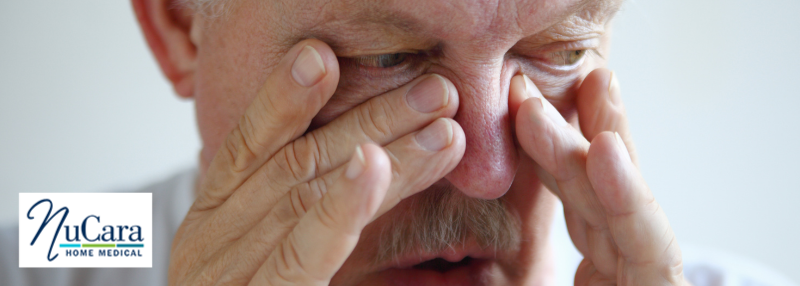NuCara Home Medical
Updated 5:43 PM CST, Tue November 25, 2025
Published Under: CPAP Therapy & Tips

If you’re just starting CPAP therapy, you might be wondering what a humidifier does, and if it’s something you really need. The truth is, a CPAP humidifier can make a big difference in how comfortable (and successful) your therapy is.
In this beginner-friendly guide, we’ll explain what CPAP humidifiers are, how they work, and why many people find them helpful, especially early on in their sleep apnea treatment.
What Is a CPAP Humidifier?
A CPAP humidifier is an optional add-on (or built-in feature) that adds moisture to the air delivered by your CPAP machine. Why is that important? Because CPAP air is pressurized and often dry, which can cause your mouth, nose, and throat to dry out, especially if you’re using higher pressure settings or live in a dry climate.
Adding moisture helps make that air feel more natural and comfortable — just like how your nose naturally humidifies the air you breathe during the day.
Without a humidifier, you may experience:
- Dry mouth or throat
- Nasal congestion or sinus irritation
- Nosebleeds
- Chapped lips
- Trouble falling or staying asleep
Explore CPAP Humidifiers & Accessories at NuCara
Do All CPAP Machines Have a Humidifier?
Not all CPAP machines come with a humidifier, but many modern ones do. There are three main types of humidifiers used in CPAP therapy:
- Built-in humidifiers – These are part of the CPAP machine and ready to use right out of the box.
- Integrated humidifiers – These connect directly to your machine and can be removed, which is helpful for travel.
- External humidifiers – These are separate units that connect to your machine and offer more control or capacity.
Most machines we offer at NuCara Home Medical include built-in or integrated humidifiers for convenience.
When a CPAP Humidifier Can Help
A CPAP humidifier isn’t required for everyone, but many people benefit from one, especially during the adjustment period. You might want to use a humidifier if:
- You wake up with a dry mouth or sore throat
- Your nose feels stuffy or irritated during the night
- You use higher pressure settings
- You sleep with your mouth open
- You live in a dry or cold climate
- You’re having trouble sticking with your therapy
Using a humidifier can help make therapy more comfortable, which makes it easier to use your CPAP every night — a key part of getting the full benefits of treatment.
What Is CPAP “Rainout”, and How Can You Prevent It?
One common issue CPAP users face with humidifiers is called rainout — when moisture builds up in the tubing or mask and turns into droplets.
Signs of Rainout:
- Water splashing on your face
- Gurgling or bubbling sounds in the hose
- Disrupted or uncomfortable sleep
How to Prevent Rainout:
- Use heated tubing to keep the air temperature consistent
- Adjust your humidifier’s heat and humidity settings
- Try a tubing wrap or insulation sleeve
- Keep your CPAP machine level with or below your head
At NuCara, we carry heated tubing and accessories designed to reduce rainout and keep your therapy running smoothly.
Explore Heated Tubing & Accessories
Read More: Waking Up to Water in Your CPAP Mask? Here’s What to Do
So, Do You Really Need a CPAP Humidifier?
A CPAP humidifier isn’t a must-have for every person, but for many, it’s what turns CPAP therapy from frustrating to comfortable. If you’re struggling with dryness, nasal congestion, or adjusting to therapy, trying a humidifier is a smart next step.
It’s a small change that can make a big difference in how consistent and effective your treatment is.
Explore More PAP Products Here
Shop CPAP Humidifiers and Accessories at NuCara
At NuCara Home Medical, we offer a wide selection of CPAP humidifiers, heated tubing, and replacement water chambers, all designed to keep you comfortable and on track with your therapy. Our team is happy to help you find the right fit for your machine and needs.
Browse CPAP Humidifiers Now Contact Us Today for Help
Comments